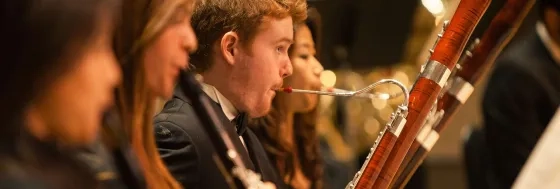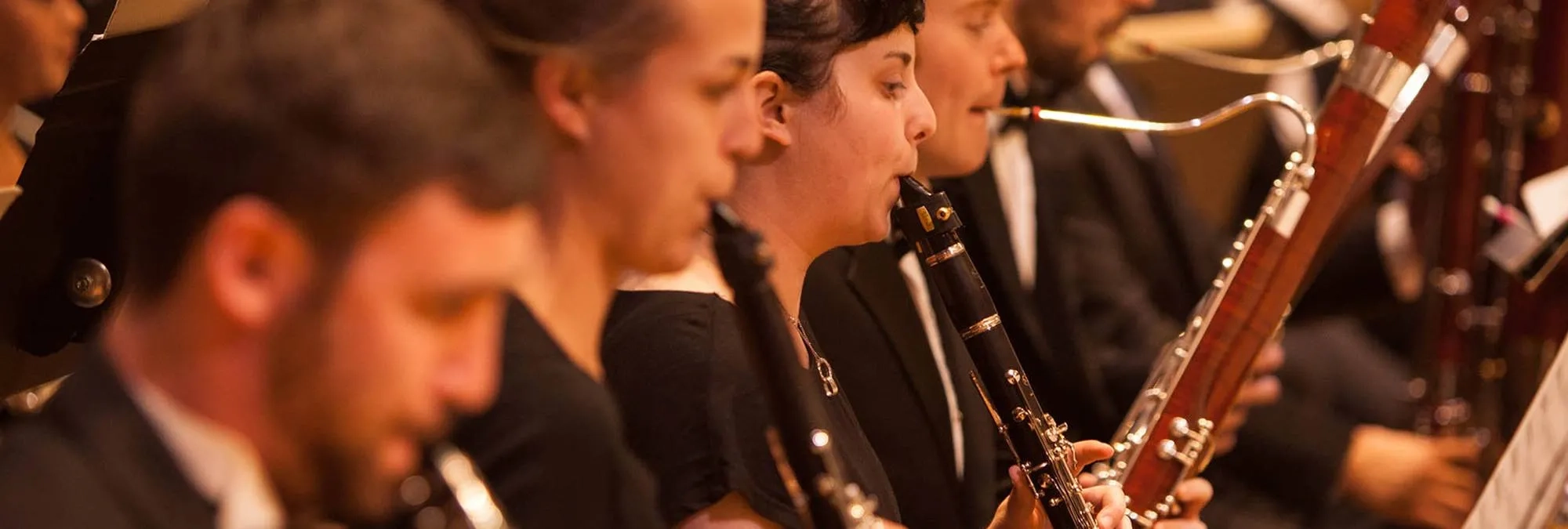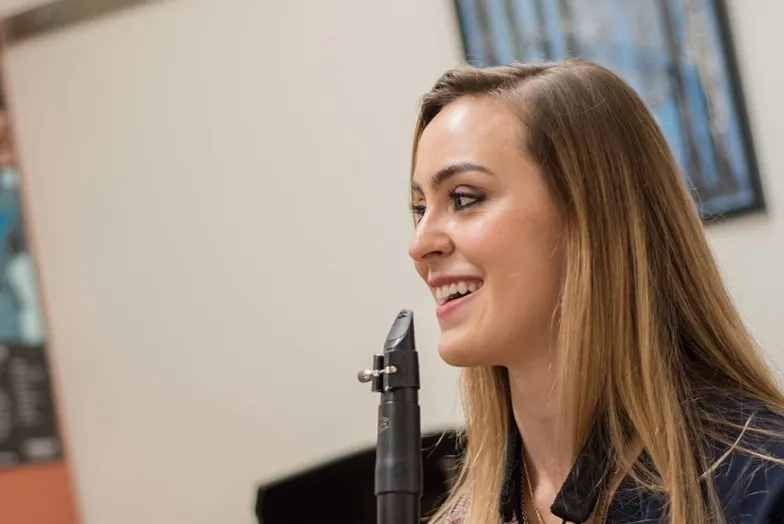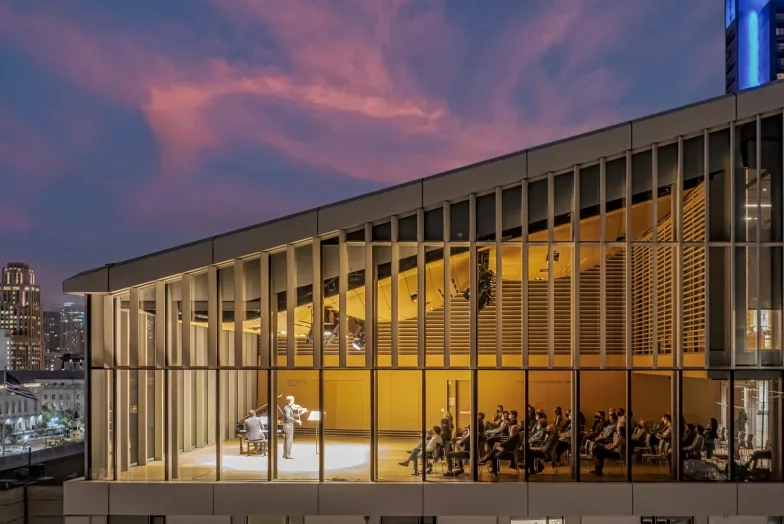Woodwinds Bachelor of Music Curriculum
Collegiate Apply / Request Information
Life isn’t an audition.
Any music school can make you a better player. Our interconnected courses are built to transform you intellectually, artistically, professionally, and individually. You’ll understand the roots of your music, freeing you to take it somewhere new. You’ll see how your training broadens your options, rather than narrowing them. You'll find your voice. And you'll enter the world with the same confidence you bring to the stage.
Required Courses
Curriculum: Bachelor of Music in Orchestral Instruments (Woodwinds)
Credit total: 129
| Requirement | Cr. |
|---|---|
| Private Instruction | 32 |
| Performance Classes | 4 |
| Keyboard Skills | 2 |
| Humanities and Sciences | 24 |
| Musicianship and Music Theory | 20 |
| Music History and Literature | 12 |
| Professional Development | 4 |
| Ensembles | 26 |
| Electives | 5 |
| Winter Term | 3 Years |
| Digital Portfolio | 4 Years |
| Recitals | 4 |
| Recitals | 1 |
Repertoire Requirements for Wind Majors
Flute
Freshman Jury
- Concerti: Quantz G Major, Mozart D Major or G Major
- Sonatas: Hindemith, J.S. Bach, C.P.E. Bach, Poulenc
- Pieces: Griffes Poème, Telemann Fantasias for solo flute, Chaminade Concertino, Fukushima Mei
Sophomore Jury
- Concerti: Vivaldi "Il Cardellino" in D Major, Op. 10, No. 3, Mozart Concerto in G Major (with cadenzas)
- Sonatas: Piston, Dutilleux Sonatine, Bach (any with keyboard), Sancan Sonatine
- Pieces: Martin Ballade, Telemann Suite in A Minor, Hüe Fantasie, Hindemith Acht Stücke, Berio Sequenza
Junior Jury
- Concerti: Mozart Concerto in D Major (with cadenzas), Ibert, Nielsen
- Sonatas: Martinů, Reynolds, Prokofiev, Gaubert
- Orchestral repertoire
Senior Jury and Senior Recital
- Similar to junior jury, with strong concentration on orchestral repertoire. All movements of each work are required. Works need not be performed from memory.
- Flute majors must perform a senior recital to determine fulfillment of performance requirements.
Oboe
Freshman Jury
- One étude by Barret or Ferling
- One classical work
- One impressionistic or contemporary work
- Jury music must be prepared during the freshman year
Sophomore Jury
- One étude by Ferling
- One baroque or classical work
- One romantic or contemporary work
- Jury music must be prepared during the sophomore year
Junior Jury
A 35- to 45-minute program of material prepared during the junior year, to be approved by the major teacher. The program should include:
- One movement of a sonata or concerto, preferably with piano accompaniment
- One étude from the Grand Studies by Barret or Études by Ferling
- Three orchestral excerpts: Beethoven, "Funeral March" from the Eroica Symphony, first solo passage; Ravel Tombeau de Couperin, opening solo from Prelude; Rossini La scala di seta, fast staccato solo
- Jury music must be prepared during the Sophomore year
Senior Jury and Senior Recital
- A full program of at least 40–50 minutes, to be approved by the major teacher. Music from a variety of historical periods and genres, as well as chamber music with prominent oboe parts, is encouraged.
- Oboe majors must perform a senior recital to determine fulfillment of performance requirements.
Clarinet
Freshman Jury
- Études and studies: Baermann Method for Clarinet, Third Division; Kell 17 Staccato Studies; Klosé 45 Exercises on Articulation and 12 Studies in the Various Registers; Rose 32 Études for Clarinet; Thurston Passage Studies for Clarinet, Vol. 1
- Solo literature: Saint-Saëns Sonata, Op. 167; Schumann Fantasy Pieces, Op. 73; Mozart Concerto in A Major, K. 622; Carl Stamitz Concerto No. 3 in B-flat Major; Weber Concertino, Op. 26
Sophomore Jury
- Études and studies: Baermann Method for Clarinet, Part 4; Gates Odd Meter Études; Rose Studies for Clarinet; Voxman Classical Studies for Clarinet(Bach and Handel); transposition study
- Solo literature: Hindemith Sonata (1939); Johann Stamitz Concerto in B-flat Major; Weber Concerti in F and E-flat Major, Op. 73 and 74; Brahms Sonatas in F Minor and E-flat Major, Op. 120, Nos. 1 and 2
Junior Jury
- Études and studies: Baermann Method for Clarinet, Part 5; Rose 20 Grandes Études after Rode; Cavallini 30 Caprices; transposition study; orchestral excerpts
- Solo literature: Weber Grand Duo Concertant, Op. 48; Poulenc Sonata; Hindemith Concerto; Spohr Concerto
Senior Jury and Senior Recital
- Études and studies: Uhl 48 Études; Sigel The Twentieth-Century Clarinetist; Jeanjean 16 Études Modernes; orchestral excerpts
- Solo literature: Debussy Première Rhapsodie; Stravinsky Three Pieces for Solo Clarinet; Copland Concerto; Nielsen Concerto, Op. 57; Berg Four Pieces for Clarinet and Piano, Op. 5
- Clarinet majors must perform a senior recital to determine fulfillment of performance requirements.
Bassoon
Freshman Jury
- Major and minor scales
- Weissenborn Advanced Studies
- Milde Scale Studies
- Telemann Sonata in F minor; Galliard sonatas or other works of equivalent difficulty
- Orchestral excerpts
- Reed-making
Sophomore Jury
- Major and minor scales and arpeggios
- Milde Concert Studies
- Kovar 24 Daily Exercises
- Giampieri 16 Studies; Bozza Studies
- Hindemith Sonata
- Weber Concerto or other work of equivalent difficulty
- Orchestral excerpts
- Reed-making
Junior Jury
- Orefici Bravura Studies
- Pierne New Techniques of Bassoon
- Piard Studies
- Mozart Concerto or other work of equivalent difficulty
- Orchestral excerpts
- Reed-making
Senior Jury and Senior Recital
- Mozart concerti
- Vivaldi concerti
- Hummel Concerto
- Bach cello suites
- Saint-Saëns sonata or other work of equivalent difficulty
- Orchestral excerpts from memory
- Reed-making
- Bassoon majors must perform a senior recital to determine fulfillment of performance requirements.




